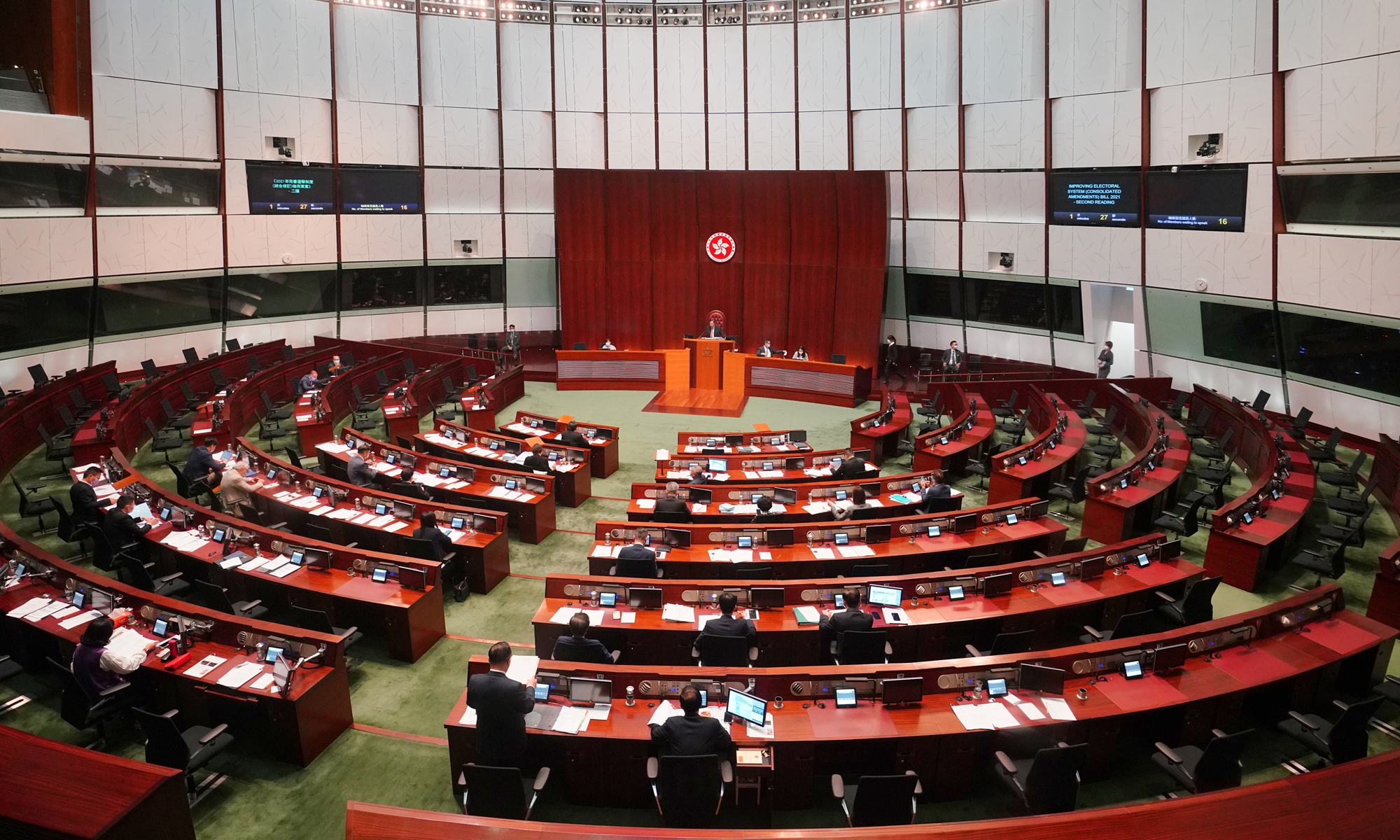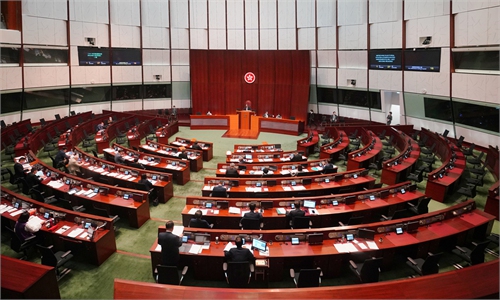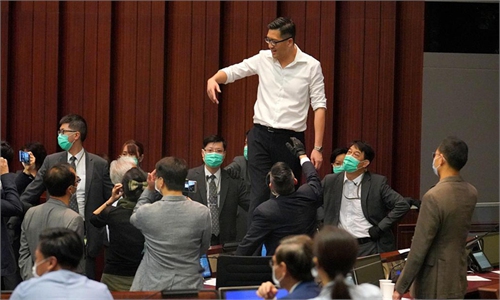Radical opposition shakes constitutional foundation in US, while HK remedies the issue

Legislative Council of Hong Kong (LegCo) Photo: VCG
Lord Hobhouse, a member of the Radical Party in the UK Parliament in the early 19th century, is frequently credited with encapsulating the concept of a loyal opposition. In a speech to Parliament in 1826, he argued that non-governing parties may oppose government policies, while remaining entirely loyal to the constitution and to the King.Here is a helpful contemporary definition of a loyal opposition:
A minority party especially in a legislative body whose opposition to the government is constructive, responsible, and bounded by loyalty to indispensable constitutional principles.
A US commentator, Eric Black, recently observed that, in the American context, the same basic understanding prevails, in that the party out of power may oppose the policies of the government, but that opposing-party must remain loyal to fundamental elements of the constitution and the system of politics.
The enduring application of this deep, political understanding, where it applies in much of the developed West, has depended on adherence to certain comprehensively respected norms of political behavior, often classified as constitutional conventions. That is, widely shared, profound political perceptions rather than enforceable legal provisions have governed how this concept works in practice.
Another way of stating the central function of this term is that it tells us that all those involved in the central political processes of a given jurisdiction must be patriotically committed to the fundamental constitutional order which applies within that jurisdiction.
Things can, however, go wrong - as they did in Washington on January 6, 2021.
The next day was the day on which Joe Biden was formally named, by Congress, as the 46th President of the United States, following his election victory in November, 2020. But core supporters of Donald Trump, within this opposition, paid no heed whatsoever to the norms governing how a loyal opposition should behave. They flouted longstanding norms - and the basic constitutional order - by staging a deadly insurrection on that day. Although this attempt to stop the formal confirmation of Joe Biden's victory failed, it gravely shook the constitutional foundations of the US.
Hong Kong Special Administrative Region(HKSAR) has suffered still more severely from a flouting of the fundamental norms of how loyal opposition should behave. The opposition group within and outside of LegCo intensified their confrontations with the HKSAR Government well over a decade ago. Under their direct influence, LegCo became the most dysfunctional arm of governance in the HKSAR. Offensive political stunts, obdurate filibustering and all manner of delaying tactics became the norm, leading to regular physical confrontations and manufactured chaos. Opposition LegCo members politicized and stalled numerous important policy proposals, they had no understanding of - nor interest in - maintaining the basic institutional integrity of LegCo. In 2014, a leading member of the House of Lords, who visited LegCo, observed that this sort of dismal behavior was unthinkable within the British Parliament.
Subsequently, leading opposition figures, notably including LegCo members, worked assiduously to support the immensely disruptive, three month Occupy Central Movement in 2014, prior to vetoing a key chance to advance political reform in the LegCo. Next, the broad opposition group became thoroughly enmeshed in mass protests during 2019, and the highly destructive, extended political insurgency, which swiftly grew out from those protests. Leading group members became closely involved in advancing - or rationalizing - the most extensive, violent political crisis faced by Hong Kong in over 50 years.
The evidence was incontrovertible: the broad opposition in the HKSAR had, like Trump supporters on January 6, 2021, lost sight of the fundamental norms spelling out the deep political behaviour obligations of a loyal opposition. In both cases, these profound normative guard-rails were simply jumped over and terrible violence and destruction followed. In the US, the mayhem lasted for around 7 hours on January 6, 2021. In Hong Kong the insurrection ran for over seven months, from early June, 2019.
More particularly, in both the US and HKSAR we can see how a militantly determined radical minority was able to establish primary control, by first setting a highly disruptive action-agenda, before, next, leading the rest in a reckless and violent attempt to enforce their demands.
The US is still struggling to deal with what Francis Fukuyama identifies as a profound internal threat, new tribalism. Some commentators argue that America is now caught up in a cold civil war. An Edelman poll in early 2021 found that over 50% of Americans believe that some form of cold civil war is underway in the US.
Hong Kong, on the other hand, has, fortunately, benefited from the implementation of effective remedies. Political stability has been restored and the ongoing achievements of One Country Two Systems have been secured by the application of certain critical legal reforms in the HKSAR: the new National Security Law and major electoral reforms. The latter make it clear that, henceforward, those involved in governing Hong Kong must be patriots who will be bound, under oath, to support the fundamental constitutional order of the HKSAR and China.
The old loyal opposition constitutional conventions were flagrantly ignored in the HKSAR. They failed under pressure. Hong Kong has now, however, legally entrenched the central, positive essence of those well-grounded governance norms.
The author is a visiting professor at the Faculty of Law, Hong Kong University. opinion@globaltimes.com.cn



